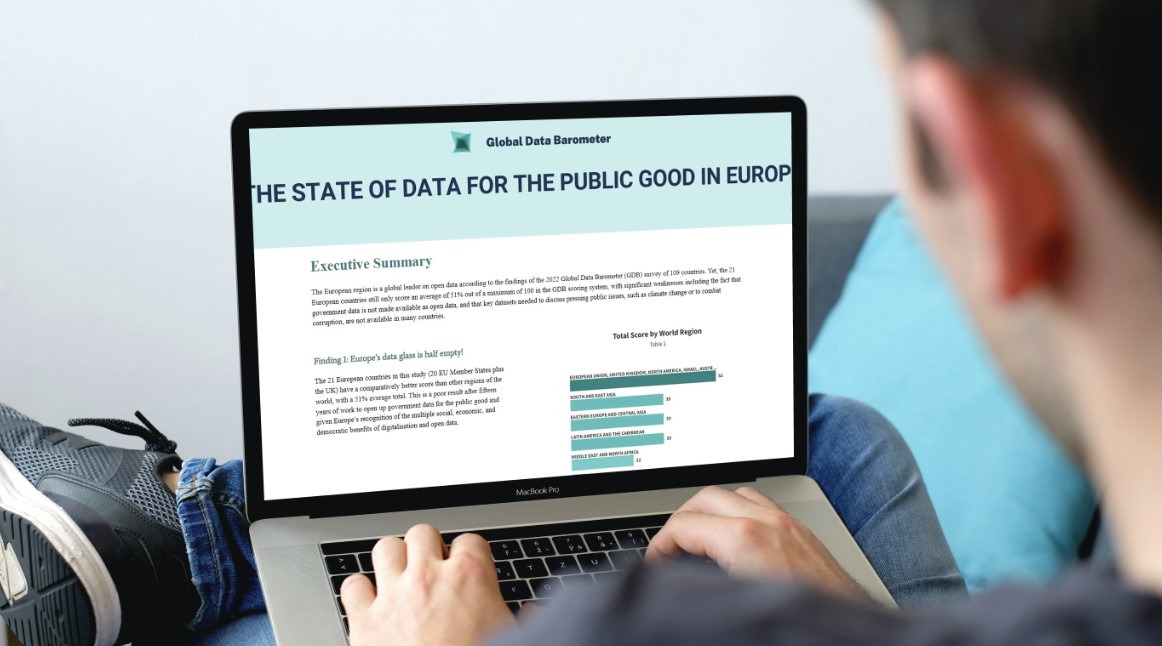Madrid, 22 December 2022 – Access Info is today calling on the European Union and EU Member States to act to ensure that data needed for priority issues such as for preventing corruption and tackling climate change, is made public in all countries.
This call comes following the publication on 16 December 2022 of the report “The State of Data for the Public Good in Europe” with results of the Global Data Barometer for the European region, with concerning findings such as low scores for Climate Action data at only 44% and Political Integrity – data essential to prevent corruption – at only 38%.
Helen Darbishire, Executive Director of Access Info Europe commented:
It is imperative that data needed to advance the work on urgent issues, such as corruption and climate change, is collected and made available as open data by EU bodies and European governments so as to act in a timely ways and rather than just wait for scandals to happen, such as the recent Qatargate.
The Global Data Barometer survey also revealed a significant variation between European countries, ranging from the high-scoring country Estonia with 67% – the second highest scoring country in the world, just behind the USA with 68% – and the lowest scoring countries of Malta, Greece and Lithuania with just 37%. The weaker countries brought the regional average down to a disappointing 51%.
Find out more about ‘The State of Data for the Public Good in Europe’.
Watch the launch event here.
A particularly important finding of the Global Data Barometer was that regulation makes a difference, with a strong correlation between the existence of a regulation and data availability. This is true for strong performers such as France (66%) and the UK (65%), but even for countries which did not have strong performance overall, such as Bulgaria (50%) or Croatia (48%), but which do have data available where there are rules requiring it.
Access Info also notes that Europe does reasonably well with publication of health and Covid-19 data (61%), along with public finance (60%) and public procurement data (55%), which indicates what is possible with political will and the right rules and technical infrastructure in place.
Recommendations: Prioritise data for public good
The key recommendations developed by Access Info are:
The European Union as a whole should review the levels of publication of key datasets as identified by the GDB with a view to informing its open data strategies and other rules that require Member States (MS) to publish data. More specifically:
The European Commission should:
- Ensure that the current revision of the list of High-Value Datasets under the Open Data Directive makes it a priority to include datasets on climate change and those needed for preventing corruption.
- Have as immediate open data priorities the beneficiaries of all EU funds, ownership and beneficial ownership of companies, open land tenure data, regulation of lobbying, and rules on conflicts of interest and assets declarations.
- Support capacity building in the MS which are currently underperforming on open data.
The European Parliament should:
- Investigate the status of existing data listed in the Open Data Directive list of High-Value Datasets, which the Parliament has already approved, such as company registration, and why this is not yet being made public in many MS.
- Actively engage in the process of defining which data should be made available relating to tackling climate change, including through open data obligations and use of EU funds such as RRF funds.
EU Member states should:
- Strengthen and expand the legal framework requiring the collection, management and publication of key datasets, with such regulations mandating that data is released in accordance with open data standards.
- Ensure that data needed to prevent and expose corruption is made available immediately as fully open data, prioritising company registration and ownership data, including beneficial ownership of companies, land registration and use data, and lobbying data.
- Strengthen their digital and data capacities where needed, and increase support for the reuse of public data.
The report also includes recommendations for the Open Government Partnership, the OECD, and for civil society organisations. You can read the full set of recommendations here.
Watch the recording of the launch event here:

